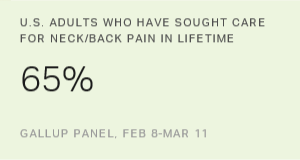Story Highlights
- One in four U.S. adults sought care for back/neck pain last year
- 35.5 million U.S. adults saw a chiropractor in the past year
WASHINGTON, D.C. -- A new Gallup study highlights the extent to which neck and back pain affect American adults, with one in four reporting that they have seen a healthcare professional for significant neck or back pain within the past year and nearly two-thirds (65%) saying they have done so at some point in their lives.
| National adults | |||||||||||||||||||||||||||||||||||||||||||||||||||||||||||||||||||||||||||||||||||||||||||||||||||
|---|---|---|---|---|---|---|---|---|---|---|---|---|---|---|---|---|---|---|---|---|---|---|---|---|---|---|---|---|---|---|---|---|---|---|---|---|---|---|---|---|---|---|---|---|---|---|---|---|---|---|---|---|---|---|---|---|---|---|---|---|---|---|---|---|---|---|---|---|---|---|---|---|---|---|---|---|---|---|---|---|---|---|---|---|---|---|---|---|---|---|---|---|---|---|---|---|---|---|---|
| % | |||||||||||||||||||||||||||||||||||||||||||||||||||||||||||||||||||||||||||||||||||||||||||||||||||
| In the last four weeks | 11 | ||||||||||||||||||||||||||||||||||||||||||||||||||||||||||||||||||||||||||||||||||||||||||||||||||
| In the last 12 months | 14 | ||||||||||||||||||||||||||||||||||||||||||||||||||||||||||||||||||||||||||||||||||||||||||||||||||
| In the last one to five years | 18 | ||||||||||||||||||||||||||||||||||||||||||||||||||||||||||||||||||||||||||||||||||||||||||||||||||
| More than five years ago | 21 | ||||||||||||||||||||||||||||||||||||||||||||||||||||||||||||||||||||||||||||||||||||||||||||||||||
| I have never had neck or back pain that required me to see a healthcare professional | 35 | ||||||||||||||||||||||||||||||||||||||||||||||||||||||||||||||||||||||||||||||||||||||||||||||||||
| Gallup Panel | |||||||||||||||||||||||||||||||||||||||||||||||||||||||||||||||||||||||||||||||||||||||||||||||||||
These findings come from a nationally representative Gallup Panel study of U.S. adults, aged 18 and older, conducted via web and mail from Feb. 8-March 11, 2016. This is the second annual Gallup study commissioned by Palmer College of Chiropractic.
The poll asked all respondents for their impressions of the effectiveness of five treatment options for neck and back pain: physical therapy, chiropractic care, prescription pain medication, back surgery and self-care. Roughly four in 10 U.S. adults (41%) say physical therapy is "very effective," while nearly three in 10 (29%) say the same about chiropractic care. Twenty-two percent describe prescription pain medication as "very effective," and 15% say this about back surgery. U.S. adults view self-care as the least effective option, rated "very effective" by just 9%.
When factoring in those who consider each approach either "somewhat" or "very" effective, majorities of Americans perceive all five types of care -- including self-care -- to be of some value.
| Physical therapy | Chiropractic care | Rx pain medication | Back surgery | Self-care | |||||||||||||||||||||||||||||||||||||||||||||||||||||||||||||||||||||||||||||||||||||||||||||||
|---|---|---|---|---|---|---|---|---|---|---|---|---|---|---|---|---|---|---|---|---|---|---|---|---|---|---|---|---|---|---|---|---|---|---|---|---|---|---|---|---|---|---|---|---|---|---|---|---|---|---|---|---|---|---|---|---|---|---|---|---|---|---|---|---|---|---|---|---|---|---|---|---|---|---|---|---|---|---|---|---|---|---|---|---|---|---|---|---|---|---|---|---|---|---|---|---|---|---|---|
| % | % | % | % | % | |||||||||||||||||||||||||||||||||||||||||||||||||||||||||||||||||||||||||||||||||||||||||||||||
| Very effective | 41 | 29 | 22 | 15 | 9 | ||||||||||||||||||||||||||||||||||||||||||||||||||||||||||||||||||||||||||||||||||||||||||||||
| Somewhat effective | 45 | 38 | 54 | 34 | 51 | ||||||||||||||||||||||||||||||||||||||||||||||||||||||||||||||||||||||||||||||||||||||||||||||
| Not very effective | 6 | 14 | 16 | 14 | 34 | ||||||||||||||||||||||||||||||||||||||||||||||||||||||||||||||||||||||||||||||||||||||||||||||
| Don't know | 8 | 19 | 9 | 36 | 5 | ||||||||||||||||||||||||||||||||||||||||||||||||||||||||||||||||||||||||||||||||||||||||||||||
| Gallup Panel | |||||||||||||||||||||||||||||||||||||||||||||||||||||||||||||||||||||||||||||||||||||||||||||||||||
Americans are least certain of the effectiveness of back surgery, with 36% saying they "don't know" how effectively it treats significant neck or back pain. Nineteen percent say they "don't know" the effectiveness of chiropractic care -- more than double the percentage who say the same about physical therapy or prescription pain medication. Americans are least likely, at 5%, to say they "don't know" the effectiveness of self-care.
U.S. Adults More Likely to Say Physical Therapy, Chiropractic Care Are Very Safe
All treatment methods for significant neck or back pain come with some risk to a patient's health. In light of this, Gallup asked American adults to assess the safety of each of five medical treatments for neck and back pain: physical therapy, chiropractic care, back surgery, prescription pain medication and over-the-counter pain medications.
| Physical therapy | Chiropractic care | Over-the-counter pain medications | Rx pain medication | Back surgery | |||||||||||||||||||||||||||||||||||||||||||||||||||||||||||||||||||||||||||||||||||||||||||||||
|---|---|---|---|---|---|---|---|---|---|---|---|---|---|---|---|---|---|---|---|---|---|---|---|---|---|---|---|---|---|---|---|---|---|---|---|---|---|---|---|---|---|---|---|---|---|---|---|---|---|---|---|---|---|---|---|---|---|---|---|---|---|---|---|---|---|---|---|---|---|---|---|---|---|---|---|---|---|---|---|---|---|---|---|---|---|---|---|---|---|---|---|---|---|---|---|---|---|---|---|
| % | % | % | % | % | |||||||||||||||||||||||||||||||||||||||||||||||||||||||||||||||||||||||||||||||||||||||||||||||
| Very safe | 68 | 33 | 23 | 12 | 6 | ||||||||||||||||||||||||||||||||||||||||||||||||||||||||||||||||||||||||||||||||||||||||||||||
| Somewhat safe | 28 | 42 | 59 | 55 | 43 | ||||||||||||||||||||||||||||||||||||||||||||||||||||||||||||||||||||||||||||||||||||||||||||||
| Not very safe | 1 | 9 | 11 | 23 | 29 | ||||||||||||||||||||||||||||||||||||||||||||||||||||||||||||||||||||||||||||||||||||||||||||||
| Not safe at all | 0 | 4 | 3 | 8 | 9 | ||||||||||||||||||||||||||||||||||||||||||||||||||||||||||||||||||||||||||||||||||||||||||||||
| Don't know | 3 | 12 | 3 | 3 | 14 | ||||||||||||||||||||||||||||||||||||||||||||||||||||||||||||||||||||||||||||||||||||||||||||||
| Gallup Panel | |||||||||||||||||||||||||||||||||||||||||||||||||||||||||||||||||||||||||||||||||||||||||||||||||||
Physical therapy receives the highest safety ratings, with 68% of Americans describing it as "very safe." Chiropractic care is next, with 33% of U.S. adults describing it as "very safe," followed by over-the-counter medications (23%), prescription medication (12%) and back surgery (6%). All options except for back surgery are rated at least "somewhat safe" by a majority of Americans. While 49% of Americans rate back surgery as "very" or "somewhat" safe, 37% rate it as unsafe and 14% say they "don't know."
Notably, nearly a third of U.S. adults say prescription pain medication is either "not very safe" (23%) or "not safe at all" (8%), possibly reflecting recent medical attention to the risks of opioid addiction. Less than 15% of Americans rate over-the-counter medications, chiropractic care or physical therapy as unsafe.
Medical Doctor, Chiropractor Preferred If Adults Have Significant Neck/Back Pain
Gallup asked respondents to think about their preferred treatment if they were to experience neck or back pain, assuming availability and costs of each treatment would be the same. Among five specific healthcare providers -- a medical doctor, chiropractor, physical therapist, massage therapist or acupuncturist -- more than half (53%) of U.S. adults say they would most like to see a medical doctor about their neck or back pain. Ranking second, 28% of Americans say they would most like to see a chiropractor, while far fewer would most like to see a massage therapist (7%), a physical therapist (6%) or an acupuncturist (1%).
| "Most like" to see | |||||||||||||||||||||||||||||||||||||||||||||||||||||||||||||||||||||||||||||||||||||||||||||||||||
|---|---|---|---|---|---|---|---|---|---|---|---|---|---|---|---|---|---|---|---|---|---|---|---|---|---|---|---|---|---|---|---|---|---|---|---|---|---|---|---|---|---|---|---|---|---|---|---|---|---|---|---|---|---|---|---|---|---|---|---|---|---|---|---|---|---|---|---|---|---|---|---|---|---|---|---|---|---|---|---|---|---|---|---|---|---|---|---|---|---|---|---|---|---|---|---|---|---|---|---|
| % | |||||||||||||||||||||||||||||||||||||||||||||||||||||||||||||||||||||||||||||||||||||||||||||||||||
| Medical doctor | 53 | ||||||||||||||||||||||||||||||||||||||||||||||||||||||||||||||||||||||||||||||||||||||||||||||||||
| Chiropractor | 28 | ||||||||||||||||||||||||||||||||||||||||||||||||||||||||||||||||||||||||||||||||||||||||||||||||||
| Massage therapist | 7 | ||||||||||||||||||||||||||||||||||||||||||||||||||||||||||||||||||||||||||||||||||||||||||||||||||
| Physical therapist | 6 | ||||||||||||||||||||||||||||||||||||||||||||||||||||||||||||||||||||||||||||||||||||||||||||||||||
| Acupuncturist | 1 | ||||||||||||||||||||||||||||||||||||||||||||||||||||||||||||||||||||||||||||||||||||||||||||||||||
| Someone else | 1 | ||||||||||||||||||||||||||||||||||||||||||||||||||||||||||||||||||||||||||||||||||||||||||||||||||
| Don't know | 3 | ||||||||||||||||||||||||||||||||||||||||||||||||||||||||||||||||||||||||||||||||||||||||||||||||||
| Gallup Panel | |||||||||||||||||||||||||||||||||||||||||||||||||||||||||||||||||||||||||||||||||||||||||||||||||||
Bottom Line
Neck and back pain affect many U.S. adults' lives -- a majority report having significant enough pain that they saw a healthcare professional for care at some point in their lives, and one-fourth say they sought medical care for this type of pain within the past year. However, Americans' perceptions of the effectiveness and risks associated with treatment methods for neck or back pain are highly varied. Americans are most likely to describe physical therapy as "very safe" and "very effective," followed by chiropractic care, with pain medications and back surgery further behind. A majority of U.S. adults say they would most like to see a medical doctor for significant neck or back pain, while more than one in four would choose to see a chiropractor. Roughly one-fourth of U.S. adults say they have seen a chiropractor in the past five years, with more than half (35.5 million) doing so in the past 12 months.
Read the full report on the second annual study.
Survey Methods
Palmer College of Chiropractic commissioned Gallup to design and conduct an annual, nationally representative study of Americans' perceptions of and experiences with chiropractic care. Chiropractic care can include adjustments of the spine or other joints, physical therapy, heat and ice therapy, and therapeutic massage, among other things.
Results are based on a Gallup Panel web and mail study completed by 7,645 national adults -- 7,023 from web and 622 from mail -- aged 18 and older, conducted Feb. 8-March 11, 2016. The Gallup Panel is a probability-based longitudinal panel of more than 100,000 U.S. adults whom Gallup selects using random-digit-dial phone interviews that cover landline and cellular telephone numbers. Gallup also uses address-based sampling methods to recruit Panel members.
The Gallup Panel is not an opt-in panel, and members do not receive incentives for participating. The sample for this study was weighted to be demographically representative of the U.S. adult population, using 2012 Current Population Survey figures. For results based on this sample, one can say that the maximum margin of sampling error is ±1.8 percentage points at the 95% confidence level. Margins of error are higher for subsamples. In addition to sampling error, question wording and practical difficulties in conducting surveys can introduce error and bias into the findings of public opinion polls.

